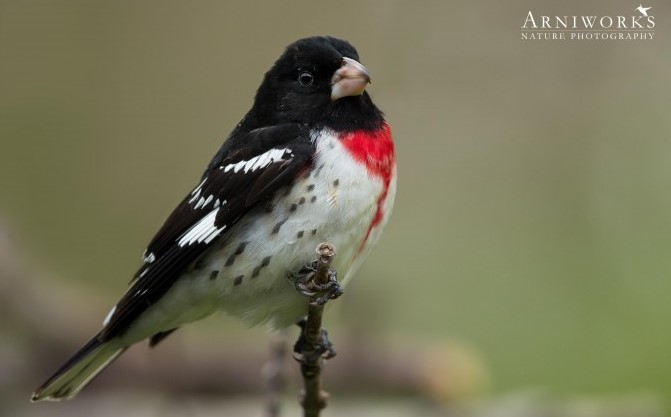In the bird world, there is a basic premise that male birds with bright plumage leave nest building and incubation duties to the female as their bright colours would attract would-be predators to the nest site. I guess that theory was left out of the young male Rose-breasted Grosbeak’s school curriculum, because they engage, along with the female in all of those activities.
And what a beautiful bird specimen he is, with bright white, black and rose colouration as can be seen in Arni Stinnissen’s stunning photo. Females are beautiful in their own right and look very similar to female Purple finches, but larger.
As with most birds, Rose-breasted Grosbeaks are most often heard before they are seen. The song of the Rose-breasted Grosbeak is similar to an American Robin, but far more melodious. Both males and females will sing to each other. Once heard, they are much easier to spot, frequently high in the canopy. Their habitat consists of open deciduous woods and forest edges, accompanied by low shrubs, often at the edge or near a swamp or a stream. However I have seen them at bird feeders far from forested areas.
The diet of Rose-breasted Grosbeak consists of seeds, berries and insects. They especially like black oil sunflower seeds which they will devour rapidly from your bird feeders, especially during the spring and fall migration periods.
As with most birds,
Rose-breasted Grosbeaks
are most often heard
before they are seen.The song of
the Rose-breasted Grosbeak is
similar to an American Robin, but
far more melodious.
Nests are built primarily in deciduous trees or large shrubs. Nests are rather flimsy, built with twigs, leaves and animal hair sometimes it is possible to see right through them. In courtship, males will spread their wings and tail and hold their heads back, singing as he approaches the female. Three or four pale bluish/ green eggs are laid and are incubated for about two weeks by both parents in spite of him being so conspicuous. And to make matters even worse, males will even sing while they are incubating the eggs. Males are extremely territorial and will fight with intruding male birds if they enter the territory. Nests are very susceptible to egg dumping by brown headed cowbirds, who will destroy the grosbeak eggs and or young. The Grosbeaks will raise the cowbird young.
Rose-breasted Grosbeaks will begin to return from their winter get-away back into our area in the next few weeks, so keep those sunflower feeders well stocked, you may just be lucky enough to play host to these beautiful birds as they drop in to your neighbourhood.
Written by David A. Homer.

